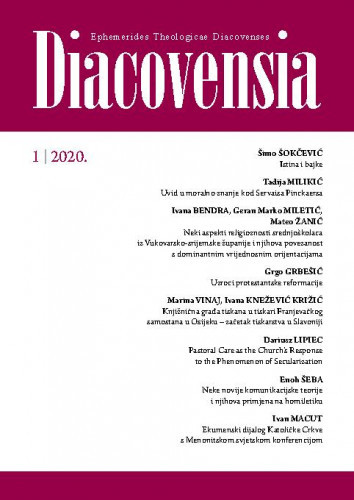U ovom radu autor progovara o ekumenskom dijalogu između Katoličke Crkve, tj. Papinskoga vijeća za promicanje jedinstva kršćana, i menonita, tj. Menonitske svjetske konferencije. U uvodu rada autor je ukratko predstavio povijesni kontekst nastanka menonita spominjući na poseban način Menna Simonsa, osnivača menonita. U prvom poglavlju predstavljena je struktura katoličko-menonitskoga ekumenskoga dijaloga pod naslovom Zajedno pozvani biti mirotvorci, a dokument sadrži ukupno 215 brojeva. U drugom poglavlju govori se o glavnim teološkim naglascima dokumenta, i to o zajedničkom ispitivanju povijesti, zajedničkom razumijevanju teologije (slaganje i neslaganje u učenju u Crkvi, učenje o sakramentima ili propisima te opredjeljenje za mir), putu prema ozdravljenju memorije. Na koncu rada autor u nekoliko rečenica donosi glavne naglaske toga bilateralnoga dijaloga i naglašava njegovu važnost za buduće jedinstvo između katolika i menonita.; In the paper, the author discusses ecumenical dialogue between the Catholic Church, i.e. the Pontifical Council for Promoting Christian Unity, and the Mennonites, i.e. the Mennonite World Conference. In the introduction, the author briefly presents the historical context of the formation of the Mennonites, mentioning particularly Menno Simons, their founder. The first chapter presents the structure of the Catholic-Mennonite ecumenical dialogue under the title Called Together to be Peacemakers, and the document itself contains a total of 215 items. The second chapter deals with the main theological emphasis of the document, namely: the joint study of history, common understanding of theology (agreement and disagreement in Church teaching, the teaching about sacraments and ordinances, and commitment to peace), and the way towards the healing of memories. In the end, the author brings the main highlights of this bilateral dialogue and emphasizes its importance for the future unity between Catholics and Mennonites.
Sažetak

 Diacovensia : teološki prilozi : 28,1(2020) / glavni i odgovorni urednik, editor-in-chief Šimo Šokčević.
Diacovensia : teološki prilozi : 28,1(2020) / glavni i odgovorni urednik, editor-in-chief Šimo Šokčević.